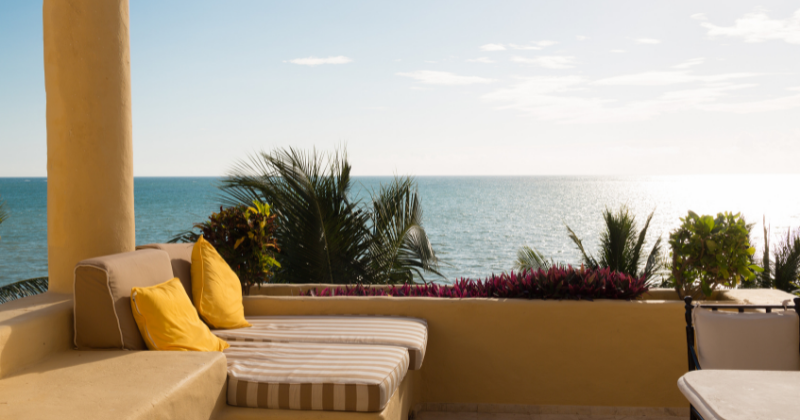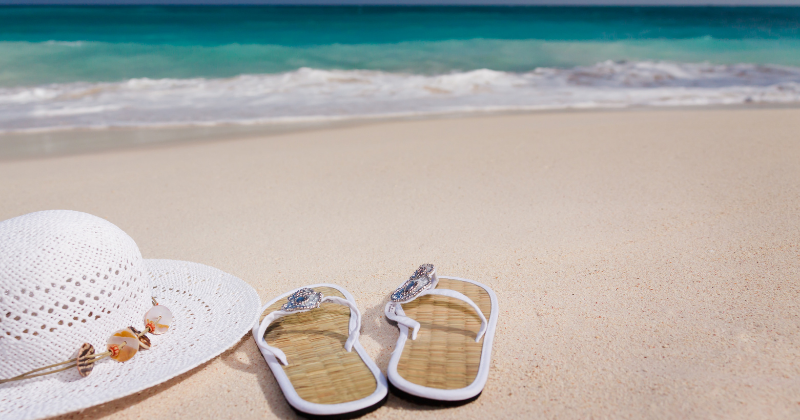Recently, we’ve had the opportunity to help a few clients sell their vacation homes – mostly condos along our beautiful Gulf coast beaches. It wasn’t that they no longer wished to vacation at their favorite beach community, but they were visiting less frequently, and the cost to benefit no longer balanced out.
Like these sellers, many homeowners are observing how the market is changing and starting to question whether they should keep or sell their vacation homes.
• Should they take advantage of home prices hitting their greatest high in years?
• Alternatively, should they hold onto it for family and grandkids to enjoy and maybe inherit down the road?
• If they sell, when and how should they do it?
• What are the tax implications?
There is a great deal to consider. Especially with so much going on in the real estate market right now, it can be challenging to think through the many options.
Reasons to Sell Your Vacation Home
If you are thinking about selling, now may be a good time. Many investment advice resources contend that demand for vacation homes is red hot right now. According to a recent report from the National Association of Realtors (NAR), in 2021, vacation home sales were up more than 16%. NAR’s study also found that prices for homes in vacation markets have been increasing faster than non-vacation markets, despite taking a little longer sell.
Especially in Florida, the demand is high. Another study by Pacaso, a second-home ownership investment company, found that beach or lake locations rank at the top of the list for preferred vacation home locations, making our vacation homes in Tampa Bay, Sanibel, and Captiva Islands prime for resale opportunity.

Sale Price and COVID’s Impact on the Vacation Home Market
This could be the right time to sell, not only because of the higher sale prices but because of recent shifts caused by the COVID pandemic. The study by Pacaso also found that 12% of second homeowners purchased their homes during the pandemic.
Many of us probably admit that COVID somehow changed our lives. Whatever changes or stress it caused, the pandemic resulted in people looking for an escape. For some, that has meant escaping to their vacation home or exploring the dream of owning one.
Remote work also contributed to the rise in vacation home sales. When it comes to adapting to the new normal in a time of COVID, another shift we’re seeing is people turning their vacation homes into their permanent residences because of the ability to work from anywhere. Why not work where you love to be?

Losing the Love for Your Vacation Home
Like our recent sellers, despite their love of beautiful, exciting, or relaxing locations, there comes a time for many people when they lose their fascination with their vacation home. Maybe the sand between their toes is no longer charming, or the beautiful falling leaves just equate to more yard work. Whether you’re growing tired of those unique vacation home features or it starts to become a chore to block out time to visit your vacation home, these are good indicators that it may be an excellent time to sell and chart a new course.
Reasons Not to Sell Your Vacation Home
Still loving and enjoying your vacation home is, of course, a great reason to hold on to it for continued use. It likely results in cost savings over other higher-cost vacation options, and it provides a secure asset that will continue to grow in value.
Inheritance
For some, a vacation home is more than just investment property – it’s a treasured family asset – a place where family members regularly unite to enjoy and celebrate time together. Keeping it in the family may be appreciated or even expected. Keep in mind inheritance doesn’t have to wait for your demise. Passing on a vacation property to loved ones now is an excellent way for you to see family members’ appreciation and be able to enjoy seeing them make the most out of their new vacation home.
Profit
Many vacation homes also can be turned into moneymaking ventures through long or short-term rentals*. Consider the best season for your vacation home and consider capitalizing on it through rental income. In Florida, this makes great sense. As a Floridian, the best time for us to visit a Gulf-front condo is in the summer, but for the rest of the world willing to pay high-priced seasonal rents, wintertime is critical. Let your vacation home make money for you.
While that sounds like a hassle, vacation management companies will do that work for you for a portion of the profit. Some good places to find these companies are through your local visitor’s bureau or chamber of commerce.
*Do be aware there are different tax implications for second homes owned for rental versus vacation. Once you shift to doing rental, your vacation home may lose its second home status and may become an investment property, which is treated and taxed differently by the Internal Revenue Service (IRS). Do your research and check with your accountant for guidance.
Alternate Vacation Options
Home swapping is an alternative to selling that might appeal to some vacation homeowners. This often is done with homeowners overseas, and it provides a great way to enjoy your vacation time elsewhere while still taking advantage of your vacation home ownership.
Market Conditions
While this is not the case for us (in most Florida vacation markets), you may own a vacation home someplace where the market is a little slower. Holding onto your vacation home temporarily might be a better plan.
Tax Implications and Strategies
This topic alone warrants a long, dedicated news piece, but it’s important to mention here because deciding to sell your vacation home can have significant tax consequences. As mentioned above, this issue can get complex, so check with your CPA/accountant for the best guidance.
A few quick pieces of beware information include understanding capital gains and a few strategies to help manage those gains. The few guidelines shared here pertain only to vacation homes, not rental properties; remember, there are differences.
Short vs. Long-term Capital Gains
Anticipating the capital gains taxes, you’ll be responsible for paying can be one of the biggest challenges you’ll face when you decide to sell your vacation home.
The IRS considers a vacation home a “personal capital asset,” similar to most second homes. As a “capital” asset, you will incur capital gains when you sell the property. For example, if you bought your vacation home for $300K and sell it for $700K, your profit is $400K (which is the amount subject to capital gains tax).
The tax rate you pay will be based on whether the property was held for more than or less than a year (long vs. short-term). Sweeney Law, a Fort Lauderdale-based real estate attorney group, provides a clear explanation: Short-term capital gains for property owned for one year or less are taxed at the same rate as ordinary income (i.e., based on which tax bracket you fall within). Long-term capital gains kick in if you’ve owned the property for more than one year. You are taxed at a reduced rate, typically 0, 15, or 20 percent. (Again, check with your CPA to calculate and discuss these outcomes.)
Short or long, it usually is more than most of us want to pay, especially when our goal is to profit from our investment. Tax advisers can walk you through numerous options to help reduce, avoid or delay these gains, including a few strategies mentioned (briefly) below.
Reducing Capital Gains on the Sale of Your Vacation Home
Inheritance: Back to the inheritance strategy mentioned above, inheritance is one way to avoid or delay capital gains if you’re not ready to sell. When your heirs inherit the property, it will be reassessed at that time, setting the new baseline for computing capital gains whenever they decide to sell.
For example, the same vacation home referenced above that you bought for $300K and sold for $700K ($400K profit) when inherited may be reassessed to $550K or $600K, meaning the profit will be much less, based on the reassessed value instead of the original purchase price. There won’t be as much profit and, therefore, less capital gains if they choose to sell it.
There may be other inheritance factors involved that could affect your tax gains – to make them higher or lower — so check with your tax advisor.
Shift to your primary residence: Another strategy explained by New Home Source is to occupy the property, shifting its designation from “vacation” home to “primary residence,” meaning the capital gains tax can be delayed and reduced. When we sell our “primary residence,” we are eligible to receive an exemption on our tax gain; $250,000 for single tax filers or $500,000 for those married filing jointly. As always, there are rules: You must have lived in a home for two out of the last five years before selling, and you must be able to provide proof of residency.
Offset Gains: You also can use your capital gains to offset other losses. If you hold the property until a year when you experience a significant loss (for example, a large stock loss or loss from a natural disaster), you can balance the gain against that loss.
Time To Sell Your Vacation Home
You’re ready to sell. Good decision. There is currently a shortage of available homes for sale, INCLUDING vacation homes. Many investors want to add short-term rental properties to their portfolios with mortgage rates still low. Thus, selling today, you’re likely to end up with a comfortable return on your investment.
When to sell is a crucial consideration. Most vacation homes are located in highly trafficked places at certain times of the year. That’s when your prime audience will be in proximity to your vacation home, and that’s when you want your property to be on the market. Not only is your target market in town, they likely have high spirits enjoying their vacation, and they feel they want to stay or come back often. What a great time to invest in their new vacation home!
Beyond your targeted season, you also should consider the time needed to get your vacation home ready for sale. Are there renovations you want to make? Are there repairs required? This is an excellent time to consult Robert Coscia, your real estate Broker, to attain his advice on the best options for improving your vacation home for sale. Some “fixes” don’t pay off, and your idea of a beautiful renovation may not be the same as potential buyers.
Selling and taxes aside, what do you do with all that cash once you’ve sold? Be prepared that it may not be easy to reinvest in another vacation home for your portfolio anytime soon in today’s market. A real estate investment trust might be one good option to consider or explore other options for second-home investment that may lessen your tax burden.
When you are ready to explore options for selling your vacation home, contact us directly: Personal Realty Advisers, phone 727-317-SOLD (7653), or email at info@PRAFlorida.com. We’ll help you plan the most opportune time to prepare and sell your vacation home.
We look forward to hearing from you.



Leave a Reply